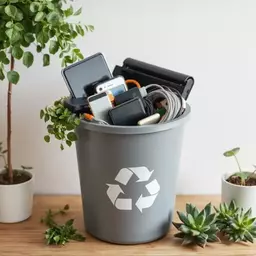Have you ever stopped to think about the impact of your daily choices on the environment? Every product we use, from the toothbrush in our bathroom to the cleaning supplies under our sink, plays a role in shaping our planet's future. Understanding the alternatives available to us is crucial for creating a sustainable lifestyle that benefits both ourselves and the Earth.
What You Will Learn
- Eco-friendly alternatives minimize environmental harm through natural materials, biodegradability, and reusability.
- Key factors that define an eco-friendly product include renewable resources, non-toxic materials, and sustainable manufacturing practices.
- Embracing sustainable practices not only preserves the planet for future generations but also leads to personal benefits like reduced utility bills and better health.
- Your purchasing choices influence the market; supporting sustainable businesses encourages more companies to adopt eco-friendly practices.
- Researching products, seeking certifications, and connecting with community resources can help you make informed decisions about eco-friendly options.
- Sharing your sustainable journey with others can inspire community engagement and foster a collective movement towards a greener future.
Benefits of Transitioning to Eco-Friendly Alternatives
Transitioning to eco-friendly products comes with a variety of benefits that can enhance our daily lives. Here are some key advantages:
Positive Environmental Impact
Your choices matter! By using eco-friendly alternatives, you actively participate in reducing pollution and conserving resources. Learn more about eco-friendly junk removal to further minimize your environmental footprint.
Healthier Living
Many sustainable products contain fewer chemicals, which can be gentler on your body and contribute to improved overall health.
Support for Local Economies
Choosing sustainable options often means supporting local businesses, which strengthens your community.
Financial Savings
While some eco-friendly products may have a higher upfront cost, they often save you money in the long run through durability and reduced waste.
Understanding Eco-Friendly Alternatives in Daily Life
As we navigate our daily lives, the choices we make can have a significant impact on the environment. It's essential to recognize eco-friendly alternatives that not only reduce waste but also promote a healthier planet. At Eco Habits Daily, we’re passionate about guiding you through these alternatives, helping you embrace sustainability without compromising your lifestyle. So, let's dive into what makes a product eco-friendly and why sustainable living matters!
Defining Eco-Friendly Alternatives to Everyday Products
Eco-friendly alternatives are products or practices that minimize harm to the environment. These options typically use natural materials, are biodegradable, or can be reused, significantly reducing our ecological footprint. Some examples include:
- Bamboo toothbrushes instead of plastic ones
- Reusable bags instead of single-use plastic
- Plant-based cleaning products
By choosing these alternatives, we can significantly lower the amount of waste we generate and contribute to a more sustainable future. Remember, even small changes can lead to a greater impact on the planet! Exploring easy eco-friendly habits to start can make this transition even smoother.
What Makes a Product Eco-Friendly?
A product is typically deemed eco-friendly if it meets certain criteria that promote sustainability. Some key factors include:
- Made from renewable resources
- Non-toxic ingredients and materials
- Biodegradable or recyclable packaging
- Manufactured using sustainable practices
When we choose to support these products, we not only enhance our own lives but also support companies that prioritize the planet. At Eco Habits Daily, we believe that understanding these elements is the first step toward making informed decisions.
Importance of Sustainable Living Practices
Embracing sustainable living practices is vital for several reasons. Firstly, it helps preserve the planet for future generations, ensuring that they inherit a world that is thriving, not depleted. Secondly, engaging in these practices can lead to personal benefits, such as:
- Reduced utility bills from energy-efficient products
- Healthier living environments through non-toxic materials
- Financial savings from using less disposable products
By adopting sustainable habits, we can create a positive ripple effect in our communities, inspiring others to join the movement towards a greener lifestyle. Together, we can make a difference! For more ideas, check out eco-friendly reusable product ideas.
Quick Summary
Here's a brief recap of the key points discussed so far:
- Eco-friendly alternatives significantly reduce waste and promote a healthier planet.
- Products are considered eco-friendly when made from renewable resources and non-toxic materials.
- Embracing sustainable practices leads to personal benefits, such as reduced bills and healthier living environments.
Frequently Asked Questions About Eco-Friendly Alternatives
Summarizing the Importance of Eco-Friendly Living
As we wrap up our discussion on eco-friendly living, it's crucial to reflect on the benefits these changes can bring to both our planet and ourselves. By transitioning to sustainable alternatives, we not only contribute to a healthier environment but also support a growing movement that prioritizes mindful consumption. At Eco Habits Daily, we believe that every small choice adds up, leading to substantial positive outcomes!
One of the most significant advantages of choosing eco-friendly products is the reduction in waste. When we opt for sustainable materials, we help lessen the strain on our landfills. This simple change can make a world of difference, fostering a cleaner, greener planet for future generations.
Benefits of Transitioning to Eco-Friendly Alternatives
Transitioning to eco-friendly products comes with a variety of benefits that can enhance our daily lives. Here are some key advantages:
- Positive Environmental Impact: Your choices matter! By using eco-friendly alternatives, you actively participate in reducing pollution and conserving resources.
- Healthier Living: Many sustainable products contain fewer chemicals, which can be gentler on your body and contribute to improved overall health.
- Support for Local Economies: Choosing sustainable options often means supporting local businesses, which strengthens your community.
- Financial Savings: While some eco-friendly products may have a higher upfront cost, they often save you money in the long run through durability and reduced waste.
Positive Environmental Impact: How You Contribute
Every time you choose an eco-friendly product, you’re making a conscious decision that benefits the environment. For example, by switching to reusable items instead of disposables, you actively help reduce the demand for single-use plastics. It’s about creating a ripple effect of positive change!
When you embrace sustainable living, you're also contributing to biodiversity conservation. Healthy ecosystems rely on less pollution and more sustainable practices. You can take pride in knowing that your choices are helping to protect our planet’s precious resources!
Supporting Sustainable Businesses: Your Role as a Consumer
As consumers, we hold great power in shaping the market. By choosing to support sustainable businesses, you’re sending a clear message that eco-friendly practices matter! This can inspire more companies to adopt similar practices, further amplifying our collective impact.
At Eco Habits Daily, we encourage you to seek out brands that align with your values. Look for businesses that prioritize sustainable sourcing, ethical labor practices, and transparent supply chains. Your support can drive positive change in the marketplace! Learning about mindful shopping for less waste can guide your decisions.
Engaging in Sustainable Practices: A Call to Action
With the knowledge you've gained about eco-friendly alternatives, it’s time to take action! Engaging in sustainable practices can seem daunting, but every small step counts. Together, we can make our world a more sustainable place!
Making Informed Decisions as a Consumer
When it comes to purchasing eco-friendly products, being informed is key. Here are some tips to help you make better choices:
- Research products: Utilize online resources to verify the sustainability claims of items before you buy.
- Seek certifications: Look for eco-labels, which can indicate genuine sustainable practices.
- Read reviews: Learn from the experiences of other consumers who prioritize eco-friendly options.
- Ask questions: Don’t hesitate to reach out to brands regarding their sustainability efforts!
Utilizing Resources for Sustainable Product Research
There are numerous resources available to help you identify sustainable products. Websites dedicated to eco-friendly living, reviews, and forums can be great starting points. By leveraging these tools, you can navigate the world of eco-friendly products with confidence!
Additionally, local community groups often share recommendations for sustainable brands and products. Connecting with like-minded individuals can provide invaluable insights and support on your journey toward a greener lifestyle. Consider exploring choosing sustainable products mindfully for further guidance.
Joining the Movement Towards a Sustainable Future
Now, more than ever, it's essential to share your journey toward sustainable living. By doing so, you can inspire others to follow suit! Here are some ways to engage others and spread the message of sustainability:
- Share your experiences: Use social media to document your eco-friendly choices and encourage others to join you.
- Start conversations: Discuss sustainable living with family and friends, making it a topic of interest in your circles.
- Host workshops: Organize events or potlucks that highlight sustainable practices and encourage community involvement!
Promoting Locally Sourced Foods: A Step Towards Sustainability
Another impactful way to contribute to sustainability is by promoting locally sourced foods. Not only does this support local farmers and businesses, but it also reduces the carbon footprint associated with transporting food over long distances. Plus, local produce is often fresher and more nutritious!
Consider visiting your local farmers' market or joining a community-supported agriculture (CSA) program. By making these choices, you're not just benefiting yourself but fostering a community that values sustainability. Together, we can create a brighter, greener future for all!
Recap of Key Points
Here is a quick recap of the important points discussed in the article:
- Choose Eco-Friendly Alternatives: Opt for products like bamboo toothbrushes and reusable bags to reduce waste.
- Understand Eco-Friendly Criteria: Look for products made from renewable resources, with non-toxic ingredients and biodegradable packaging.
- Engage in Sustainable Living: Embrace practices that preserve the environment for future generations while benefiting your health and finances.
- Make Informed Consumer Choices: Research products, seek certifications, and read reviews to ensure sustainability claims are valid.
- Support Sustainable Businesses: Your purchasing decisions can encourage companies to adopt eco-friendly practices.
- Promote Local Foods: Support local farmers and reduce carbon footprints by choosing locally sourced produce.









